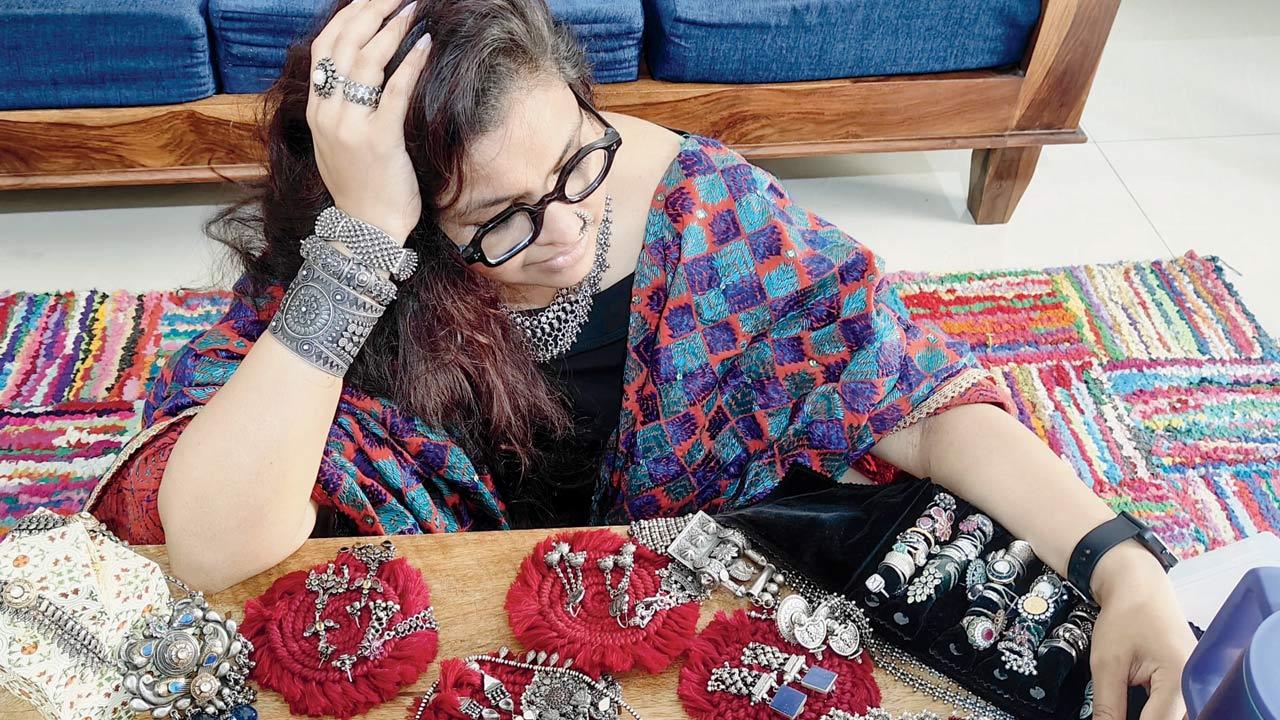It’s 2025 and it’s okay to shun hustle culture and strenuous 9-5s. That’s why many mindful young women are embracing a “soft life”—prioritising leisure and wellbeing by being their own boss

For some women who once thrived on the adrenaline of deadlines and ambitious five-year plans, the allure of stepping off the hustle train and adopting a more slow approach to life is becoming irresistible. Illustration/Uday Mohite
We all crave for the slow life. A cup of coffee, as lo-fi music flows through the speakers, reading a book, making notes in a pretty journal, a long warm bath, skin care, maybe even a yoga session—taking it easy before the mad day takes over. But is it really possible? Some women are trying to turn their slow life dreams into a reality, as for them, over the last couple of years, the sheen of hustle culture has dimmed. Many now are rejecting the relentless 9-5 grind in favour of what some may call the feminine urge to live a life imbued with slowness, mindfulness and leisure.
ADVERTISEMENT
And it’s clear to see—from the rise of wellness retreats to the growing popularity of slow-living influencers like the aspirational (or annoying, depends on who you ask) Nara Smith. Infamous for her “modern homemaker” persona, Smith’s fame has heralded a subtle yet profound shift in how some women define success. For those who once thrived on the adrenaline of deadlines, performance reviews and ambitious five-year plans, the allure of stepping off the hustle train is becoming irresistible.
This shift in daily rhythms mirrors the online discourse around the dichotomy of the “girlboss” and the “soft girl.” Where the girlboss thrives on the grind—power dressing, caffeine-fuelled meetings, and a high-powered job—the soft girl doesn’t really find solace in the grind or getting ahead professionally. She prioritises slow living and aspires to spend her days focused on wellness and self-care, tending to both her mental and physical health first.
 For Protima Tiwary, a slow morning is one that she can have all to herself—starting with just a quick glance at her phone, followed by enjoying a cup of coffee while reading a book
For Protima Tiwary, a slow morning is one that she can have all to herself—starting with just a quick glance at her phone, followed by enjoying a cup of coffee while reading a book
“I’ve been on both sides of the spectrum,” says Benguluru based Protima Tiwary with a laugh. “When I started my career in 2012 in Mumbai, I fit into the ‘girlboss’ mold. A lot has happened since, and now I would definitely consider myself as a soft girl.” Over the years, Tiwary has come to the realisation that having a good quality of life comes before everything else. “It could be as simple as not checking my emails first thing in the morning. Instead, I’d quickly glance at my phone to make sure everything was okay, then brew some coffee, read a book, and have what some might call a slow morning—all to myself. This routine is a stark contrast to what most start-up founders would consider a “productive morning.” But for me, while I may not be earning crores every month, what I am earning is a very good quality of life,” she says with a smile.
Tiwary shares how her professional life has evolved since she decided to prioritise having a good quality of life over other materials: “Now, I juggle several part-time gigs. I work as the Communications and Events Lead at Champaca Bookstore here in Bengaluru. I also freelance as a remote brand consultant for hospitality brands and am trying to rekindle my career as a writer and content creator.”
Her current portfolio approach reflects her effort to live her life at her own pace. “In the early months of 2024, I had a severe breakdown which led me to fold up my remote brand and social media agency almost overnight. I wasn’t feeling creative—I couldn’t write, and writing is something I love,” reflects Tiwary. “I was consumed by self-doubt, my confidence was at an all-time low, and the stress was overwhelming. My mental and physical health couldn’t take it anymore. I realized I didn’t even know how to take a proper break. Even on Saturdays and Sundays, I’d be on my laptop, trying to fix things instead of resting. Eventually, it all led to burnout,” reflects Tiwary.
Also Read: ‘I barely slept, my hair fell out in bunches due to stress’
 Manasvi Bhatia and Dhara Kapadia
Manasvi Bhatia and Dhara Kapadia
For many women however, rejecting hustle culture is not an overnight decision. It’s often a gradual relaxation spurred by feelings of exhaustion or a deep dissatisfaction with a life that is solely defined by productivity. “I have always been someone who does multiple things at a time,” shares Sonali Kokra, who is now founder of The Ziddi, a handmade antique silver jewellery brand, and is also a writer for magazines and lifestyle platforms, and handles communications and brand consulting for startups. “Up until last year, I used to work at least 70-75 hours in a week as the Vice President of brand marketing at an edtech company,” she shares.
“Before quitting my job, I went over my finances with a fine-tooth comb and came to the conclusion that I would be able to sustain a comfortable lifestyle even if I didn’t work for the next three years,” laughs Kokra. “I may not be earning as much as my peers anymore, but the one thing I am sure of is that I am living intentionally. I am my own boss now and while I still may be accountable to my clients, I am no longer answerable to anyone,” she shares.
That’s a freedom that Kokra values a lot. In our society, women are answerable for a lot—hustle culture is an almost inescapable reality for most, regardless of whether they work in corporate offices or within the walls of their homes. The societal expectation that women must be everything to everyone—professional achievers, devoted mothers, supportive wives and diligent homemakers—often results in a life of relentless hustle. This dual expectation, amplified by patriarchal norms, leaves little room for rest or self-actualisation.
 Sonali Kokra, founder of The Ziddi, a handmade antique silver jewellery brand, warns against romanticising quitting the hustle, especially if one doesn’t have a concrete backup plan that could sustain their lifestyle
Sonali Kokra, founder of The Ziddi, a handmade antique silver jewellery brand, warns against romanticising quitting the hustle, especially if one doesn’t have a concrete backup plan that could sustain their lifestyle
“In no way should one romanticise quitting the hustle,” warns Kokra “Quitting is not easy, especially as a woman who has hit a significant milestone in her career. It was difficult for me, and I feel like I am still trying to come to terms with it. And hence, I wouldn’t really consider myself a soft girl. I am still working as hard and diligently as I was at my full time job, but the only difference now is that I am clear about the fact that I am not going to let my business or just work, take over my life.” While Kokra’s case is not one that completely rejects the endless grind, it reimagines the idea of success as not just a checklist of achievements, but as a life lived with intention and fulfilment.
For many women rejecting hustle culture, daily routines have taken on a slower, more intentional rhythm, often prioritising personal well-being over rigid schedules. Dhara Kapadia, who is based in Mumbai, exemplifies this shift.
“I’m based in Mumbai but work for a company in Europe,” she shares. “I’ve been with this company remotely since 2017. Because of how our work culture is structured, we don’t have set work timings. Everyone works within reasonable timelines, and we only have team meetings two or three times a month. It’s a lot like freelancing, except I have a dependable monthly income. This setup gives me a lot of flexibility and allows me to embrace the soft girl lifestyle.”
 For Sohini Bhattacharya, the realisation that her health and happiness were suffering at the hands of corporate culture led her to make a bold decision of quitting that life
For Sohini Bhattacharya, the realisation that her health and happiness were suffering at the hands of corporate culture led her to make a bold decision of quitting that life
Kapadia’s approach to her day further reflects this ethos of balance. “I’m not really a morning person, so I have the option of starting my day a little later,” she admits. “After waking up, I work out for about an hour, relax for a while, have lunch, and then start working, since I don’t have fixed hours.” This blend of autonomy and intentionality has allowed her to redefine productivity on her own terms.
The journey to finding balance between personal well-being and professional aspirations is riddled with challenges, and for Sohini Bhattacharya, the path was no different.
“I completed my Master in Pharmacy with the dream of starting my own beauty company,” she shares, reflecting on her beginnings. “Back in my postgraduate days, I formulated a sunscreen when the beauty scene in India was vastly different from what it is now. The product was visionary, and I even published a research paper on it in an international journal. I’ve always wanted to have my own beauty brand, but COVID disrupted those plans, like it did for so many others, and I had to continue the job I had.”
Bhattacharya’s journey into corporate life, however, came with its own set of hurdles. “While I’ve never shied away from hard work, I’ve found corporate culture to be manipulative and, at times, abusive. Adding to the challenges, I’ve faced significant health issues. I have PCOD, which causes severely painful menstruation, often requiring me to take strong painkillers like Tramadol or suppositories. I also deal with allergic rhinitis and atopic dermatitis, which make daily life much harder than usual.”
The realization that her health and happiness were suffering at the hands of corporate culture led her to make a bold decision. “I eventually quit corporate,” she says. The physical and mental health benefits of leaving a high-pressure 9-5 job are often immediate and significant. “Since leaving, I’ve noticed significant improvements in my health. I now have time to work out, eat properly, and avoid the stress of unachievable targets that once kept me chained to an office chair for hours without breaks.”
Her perspective on work-life balance reflects a nuanced understanding of societal pressures. “If you ask whether I’m a girl boss or a soft girl, I’d say it’s a balance. For women from middle-class backgrounds, it’s not always feasible to have slow mornings focused on Pilates, beauty routines, and health. While I wish our society made it easier to prioritise both health and work, that’s not the reality for many of us.”
Manasvi Bhatia, a 30-year-old city dweller, partially relocated to the hills during the pandemic and now spends much of her time at her holiday home, Manasi Bungalow, in Lonavala. “I realized I needed some ‘me time’ after a decade of working and hustling right after graduating from college,” she shares.
Despite her move, Bhatia admits that the hustle hasn’t entirely left her life. “I’ve always been a hustler,” she says. “I was hustling when I worked in Mumbai, and I see myself hustling even now while living a slow-paced life in the hills. To me, it’s about living without stressing about health and mental peace. A calm place, surrounded by nature and less advanced, naturally helps you achieve that. When you surround yourself with elements that bring you peace, you inevitably begin to live a peaceful life.”
The rejection of hustle culture often comes with a caveat—privilege. In India, where financial stability is a luxury for many, stepping away from a traditional 9-to-5 job isn’t always an option. For Bhatia, her journey reflects both privilege and persistence.
“If you’re able to build a life after leaving a regular 9-to-5 job, I think it’s commendable because that comes with its own set of challenges,” she explains. “Building something from scratch means hustling at all times and doing everything you can. But traditional work culture restricts growth and opportunities too. I’ve been lucky to do what I love—whether it’s brand consultancy, PR and marketing, hosting at my family-owned properties in Kutch and Lonavala, building community-driven collectives like Lonavala Local and Pune Circle, or being an influencer. I’ve been able to master my skills and channel my strengths into what I’m passionate about.”
Bhatia emphasises that privilege goes beyond financial stability. “Privilege of course is about being financially sound but it’s also about clarity in what you want, choosing your direction, and staying committed to it every day. I always tell myself: hustle from the heart, no matter what.”
As more women reject the relentless grind of hustle culture, an inevitable debate emerges about whether this shift represents a bold act of self-actualization or a retreat into traditional gender roles. Critics would argue that embracing a “soft girl” lifestyle could inadvertently reinforce patriarchal norms, framing women as less ambitious and retreating into domesticity.
However, Tiwary offers a fresh perspective. “I wrote a newsletter on soft girls and titled it ‘the Soft Girl Ambition’. Why isn’t this considered an ambition?” she asks. “Why is wanting to lead a better quality of life not seen as ambition? Unfortunately, in Indian culture, this mind-set isn’t widely accepted. Women are often expected to perform so much unseen and unpaid labour that something as simple as a slow morning becomes a luxury. For Indian women, embracing the soft girl lifestyle is, in my opinion, can be considered a step forward—a way of prioritising their own well-being over everything else, something that seems unfathomable for so many of us.”
 Subscribe today by clicking the link and stay updated with the latest news!" Click here!
Subscribe today by clicking the link and stay updated with the latest news!" Click here!







